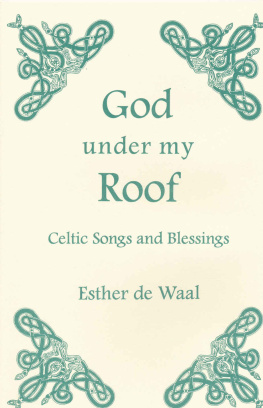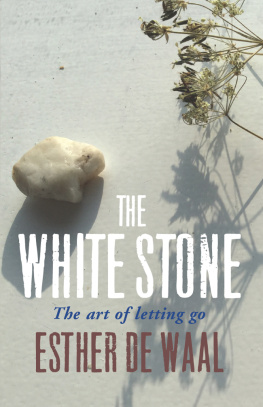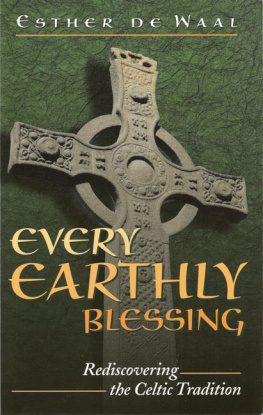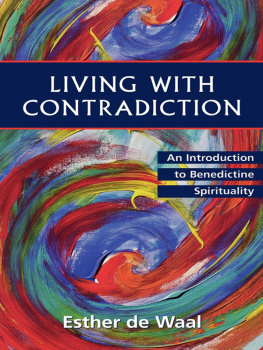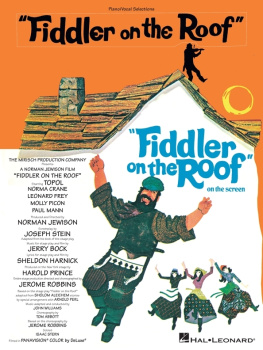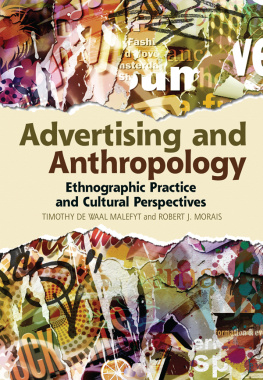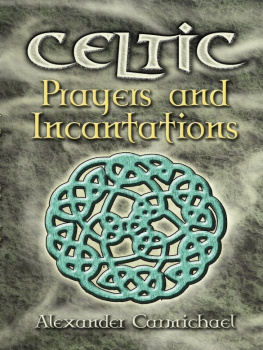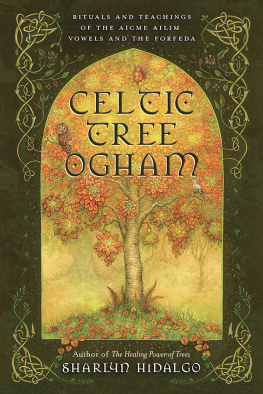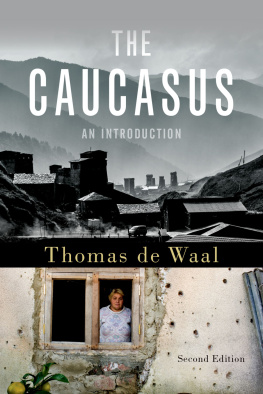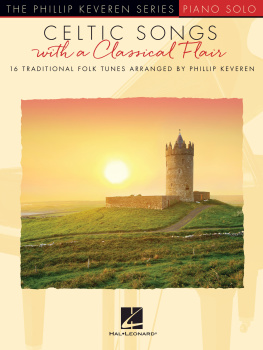Esther de Waal - God Under my Roof: Celtic Songs and Blessings (Fairacres Publications Book 87)
Here you can read online Esther de Waal - God Under my Roof: Celtic Songs and Blessings (Fairacres Publications Book 87) full text of the book (entire story) in english for free. Download pdf and epub, get meaning, cover and reviews about this ebook. year: 2019, publisher: SLG Press, genre: Religion. Description of the work, (preface) as well as reviews are available. Best literature library LitArk.com created for fans of good reading and offers a wide selection of genres:
Romance novel
Science fiction
Adventure
Detective
Science
History
Home and family
Prose
Art
Politics
Computer
Non-fiction
Religion
Business
Children
Humor
Choose a favorite category and find really read worthwhile books. Enjoy immersion in the world of imagination, feel the emotions of the characters or learn something new for yourself, make an fascinating discovery.
- Book:God Under my Roof: Celtic Songs and Blessings (Fairacres Publications Book 87)
- Author:
- Publisher:SLG Press
- Genre:
- Year:2019
- Rating:5 / 5
- Favourites:Add to favourites
- Your mark:
- 100
- 1
- 2
- 3
- 4
- 5
God Under my Roof: Celtic Songs and Blessings (Fairacres Publications Book 87): summary, description and annotation
We offer to read an annotation, description, summary or preface (depends on what the author of the book "God Under my Roof: Celtic Songs and Blessings (Fairacres Publications Book 87)" wrote himself). If you haven't found the necessary information about the book — write in the comments, we will try to find it.
God Under my Roof: Celtic Songs and Blessings (Fairacres Publications Book 87) — read online for free the complete book (whole text) full work
Below is the text of the book, divided by pages. System saving the place of the last page read, allows you to conveniently read the book "God Under my Roof: Celtic Songs and Blessings (Fairacres Publications Book 87)" online for free, without having to search again every time where you left off. Put a bookmark, and you can go to the page where you finished reading at any time.
Font size:
Interval:
Bookmark:
by Oxford eBooks Ltd. the truth about Zen Buddhism] here? Why do you wander about neglecting your own precious treasure at home? (Thomas Merton on Zen, Introduction by Irmgard Schloegl, 1976, p. 54) It is a parable that we would do well to take to heart for it suggests the relevance of our interest in these treasures of the Celtic tradition. 54) It is a parable that we would do well to take to heart for it suggests the relevance of our interest in these treasures of the Celtic tradition.
Why do we wander about neglecting our own precious treasure at home? Recent years have seen the enormous growth in exploration of other religious traditions, particularly those of the East; yet have we not failed to recognize the wealth of a tradition much nearer to us, a tradition at home in our own native islands? Why do we not seek our precious treasure very literally at home? Every form of spiritual exercise or new therapy derived from the East or even from the West is seized on with excitement, but the possibility of finding God in our everyday lives, in the prosaic and the mundane, has not caught the popular imagination with any excitement. These Celtic prayers and poems (the two are inseparable since to ask God for his blessing is already to have acknowledged his gift), the legacy of the simple farming and fishing people in the Hebrides, are shot through with an awareness of Gods presence that can speak to men and women of today. Their sense of Gods immediacy in daily living is precisely what so many people are urgently searching for today as they struggle to acquire techniques of mindfulness or to practice the contemplative approach in daily living. The self-conscious approach of our contemporaries would, of course, have been totally alien to a people who found it entirely natural to see God in every moment and at every level of their ordinary life. They walked with God, with Mary and the saints, addressing them tenderly and familiarly, and involving them in whatever they were doing. The material things of daily life almost inevitably became a way to God for a people who always speak of soul and body with equal respect and for whom the borderline of secular and sacred seems irrelevant.
Their prayers were songs and as they crooned or intoned them they seem close to the continuous prayer the Orthodox describe as a murmur in the heart. It is always easy to pursue parallels between religious traditions, and it would not be difficult to find much in common not only with Orthodoxy but also with the Hebrew attitude to man or with Eastern teaching on awareness. But it is more creative exercise to let these poems speak for themselves. They come from a people with their own particular genius and it will be sufficient if they explain themselves to us as a gift of grace, if they can touch our hearts and enrich our vision. The poems we will be considering, the Carmina Gadelica come from the Outer Hebrides, the rocky, remote and far-flung islands off the north-west coast of Scotland which were the home of a hardy pastoral and sea-going people. They were collected by an amazing scholar, Alexander Carmichael, who for the last forty years of the nineteenth century lived amongst these people, collecting and transcribing what had belonged hitherto to an entirely oral tradition.
Like many of the greatest translators, Carmichael himself was a poet. His English renderings from the Gaelic are not only faithful, but their grandeur and power show him as one of the translators through whom a masterpiece can be reborn in a new language (Adam Bittleston, The Sun Dances, Prayers and Blessings from the Gaelic, 1960, xi). Since many of those to whom he listened were already well-advanced in years, much of the material in the Carmina Gadelica would now be almost certainly two hundred years old, though Carmichael would claim that much went back to the seventeenth century, and also contained even older elements. The pattern of life in the Outer Hebrides up to the present century when evictions, emigration and education changed everything drastically, was simple. Here were crofting and fishing communities in which men and women worked hard by day and in the evenings gathered together to talk and to sing. Poetry was central to their life, poetry carried on from generation to generation by word of mouth.
Carmichael said of these people: Mirth and music, song and dance, tale and poem pervaded their lives as electricity pervades the air. (Carmina Gadelica, I, xxxiii.) He found simple old men and women in lowly homes addressing the great God of life, the Father of all living in words which were at once homely and eloquent, presenting to him their needs and desires, fully and familiarly, and yet also with awe and deference. There was little in their poetry of what is popularly assumed to characterize something Celtic, something typically misty or mystical, or vaguely pantheistic. Rather these Gaelic people found it quite natural to bring into their prayers and poems the vigour, honesty and incisive humour of their daily lives. What also in particular makes these poems unique is that unlike the much better known bardic poetry, these poems are private; they reveal what is not usually revealed to strangers and outsiders. R. D. D.
McLean, Poems of the Western Highlanders, SPCK 1961, xxvii.) Carmichael tells of an episode in which one old man, having allowed him to take down a going to sleep rune, travelled twenty-six miles the following morning to see him again and to exact a pledge that his little prayer should never be allowed to appear in print. I should not like cold eyes to read it in a book. (Op. cit., IV, xxxi.) Carmichael therefore destroyed it (and it is lost to us, as is so much of this rich treasurystamped out, destroyed, dispersed). Although certain of these songs or prayersand it is significant that it is impossible to draw any distinction between the twowere designed for communal gatherings and rituals, most were meant to be sung privately, intoned softly or crooned secretly. Catherine Macphee, a cottar, after giving Carmichael a night-shielding poem described how the women sang these verses at the time of going to sleep, then she added: the people of that day were full of hymns and prayers, full of music and songs, full of joy and innocent merriment.
By the Book itself, you would ask but to be hearing them, however long the night, however wild the weather, however miry the road, however dark the night going homeward.(Op. cit., III, 3501.) Perceiving a world in which the divisions of sacred and secular seemed irrelevant, these Gaelic people found God lovingly concerned with all aspects of their lives and felt themselves walking not only in his presence but close to the saints and angels too. Almost as a matter of course they assumed that they were surrounded by a multitude of spiritual beings, near throughout the day and nearer still in the house of sleep. The involvement of the saints, and above all, the involvement of Mary and Michael, Columba and Brigit, was taken for granted and forms a constant subject of great numbers of poems. The holy apostles guarding, The gentle martyrs guarding, The nine angels guarding, Be cherishing, be aiding me. The quiet Brigits guarding, The gentle Marys guarding, The warrior Michaels guarding, Be shielding, be aiding me.
Font size:
Interval:
Bookmark:
Similar books «God Under my Roof: Celtic Songs and Blessings (Fairacres Publications Book 87)»
Look at similar books to God Under my Roof: Celtic Songs and Blessings (Fairacres Publications Book 87). We have selected literature similar in name and meaning in the hope of providing readers with more options to find new, interesting, not yet read works.
Discussion, reviews of the book God Under my Roof: Celtic Songs and Blessings (Fairacres Publications Book 87) and just readers' own opinions. Leave your comments, write what you think about the work, its meaning or the main characters. Specify what exactly you liked and what you didn't like, and why you think so.

